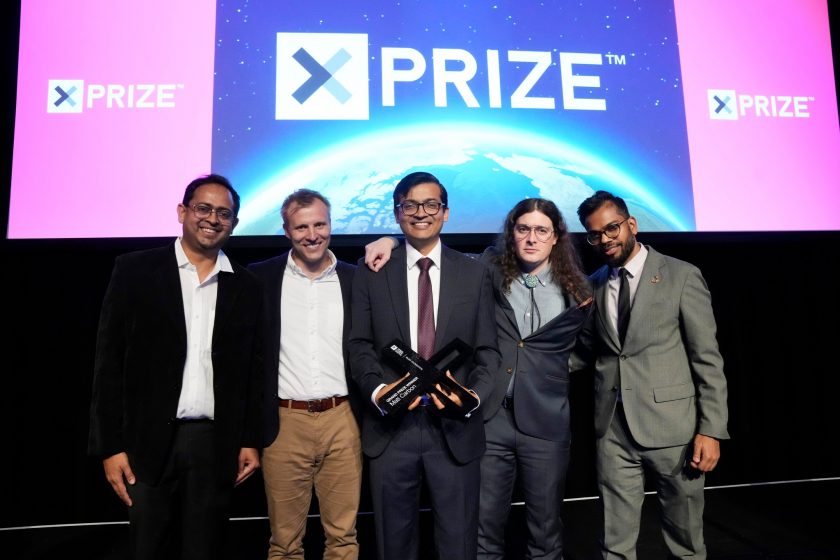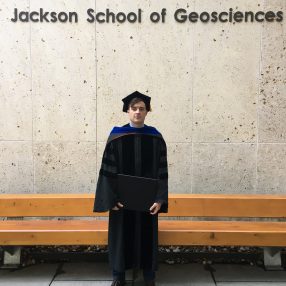Jackson School Alumnus’ Company Wins XPRIZE in Carbon Removal
June 11, 2025

The XPRIZE is a global competition for radical breakthroughs for the benefit of humanity. And for the winners of the prize, which now encompasses multiple categories, it promises a purse that can make a real impact.
But to take home a multi-million-dollar prize, a winning team has to do more than have an amazing idea. They have to show the idea works by meeting specific goals and pass muster with a board of subject matter experts.
This April, the company Mati Carbon met the challenge, winning the $50 million grand prize in carbon removal. The company was among the four finalists that successfully removed more than 1,000 net tons of carbon dioxide (CO2) in the final year of the four-year carbon removal competition, which began with over 1,300 teams from over 88 countries
Leading the company’s science team to the win was Jackson School of Geosciences alumnus Jake Jordan (Ph.D. 2017), the chief science officer for Houston-based Mati Carbon.
“We’ve been vetted by a panel of some of the most serious people I can think of for evaluating a project like this,” Jordan said. “It’s really exciting, but it’s also a pretty big mandate to be a good steward of this money and to make sure that those resources are used to better the primary stakeholders, which of course are our partner farmers.”
Mati Carbon removes CO2 from the atmosphere with enhanced rock weathering while increasing crop yields for small farmers in India and Africa, who farm on small plots without industrial fertilizers or high-tech machinery.
The company’s process involves spreading pulverized volcanic rocks onto agricultural fields. As the rock is weathered away, it undergoes chemical reactions that both trap CO2 from the atmosphere and release mineral nutrients that crops need to thrive.
Farmers working with Mati Carbon have seen their crop yields increase by about 20%, said Jordan, who presented on the yields at the annual meeting of the European Geosciences Union in Vienna this year. The company tracks the volume of stored CO2 and then sells carbon credits to corporations with net zero goals.
Mati Carbon is a textbook example of applied geoscience. But when Jordan was earning his doctoral degree at the Jackson School, he focused on fundamental science questions and developed models for the migration of magma in planetary interiors with Professor Marc Hesse.

Jordan’s doctoral research helped shed light on the transport of geochemical tracers in melts, Hesse said. He points to a paper Jordan led that mathematically demonstrated how pulses of melt transport geochemical signatures in vortices, similar to smoke rings, rather than leaving them behind, as was previously thought. Hesse also remembers how Jordan used his spare time to fix up a vintage pen-plotter to make science-informed artworks.
“In this world where everything is so focused on productivity, Jake shows that sometimes it pays not to take the straight path to come up with real innovation,” Hesse said. “That’s important to remember. It’s not just about mass output.”
Although Jordan has moved away from modeling planetary interiors at Mati Carbon, he said that there’s a thematic connection between his doctoral research and his current carbon storage work.
“What melt migration basically means is, how do these little bits of melt from the planetary interior make it onto the surface? And why do they look the way that that they do?” Jordan said. “And here I am now, trying to find those rocks so we can put them on farm land.”
Jordan first became interested in the geosciences while an undergraduate at The University of Chicago. He credits an introductory geology course with showing him that geosciences had “all the coolest problems.” He switched his major from economics to geophysics and did his undergraduate thesis research on modeling tsunamis before coming to The University of Texas at Austin for graduate school.
Jordan said that his work at Mati Carbon is driven by more than an interest in science, though. He wants to contribute to climate change solutions that bring tangible benefits to the communities that stand to be the most affected by climate change – an approach that he believes will help lead to carbon storage solutions that can work in the long run.
“One way that we can start engineering negative emissions technologies that actually stick is by paying attention to the people who are least responsible and most vulnerable to climate change and making sure that whatever solutions we push are inclusive of them and not extractive from them,” Jordan said. “That’s how we get more people with skin in the game and that’s how we start to put a dent in this thing.”
Jordan will be returning to The University of Texas at Austin in spring 2026 as a speaker at UT Energy Week and the Jackson School’s DeFord Lecture Series
